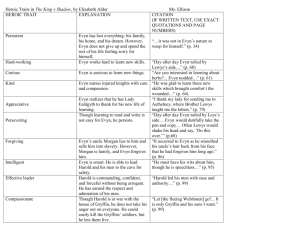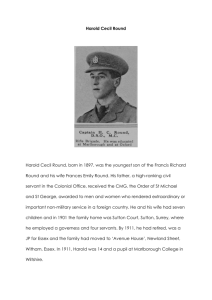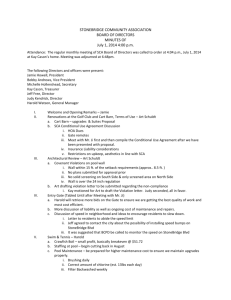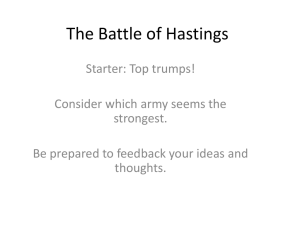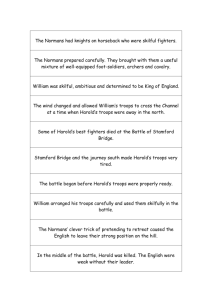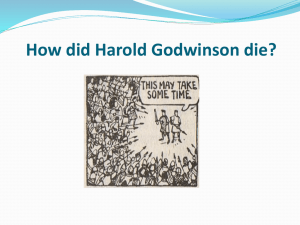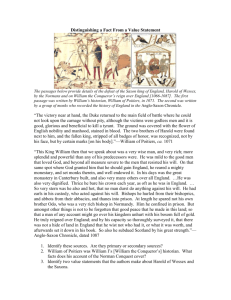Theme: maturity is the result of finding one`s identity based on reality
advertisement
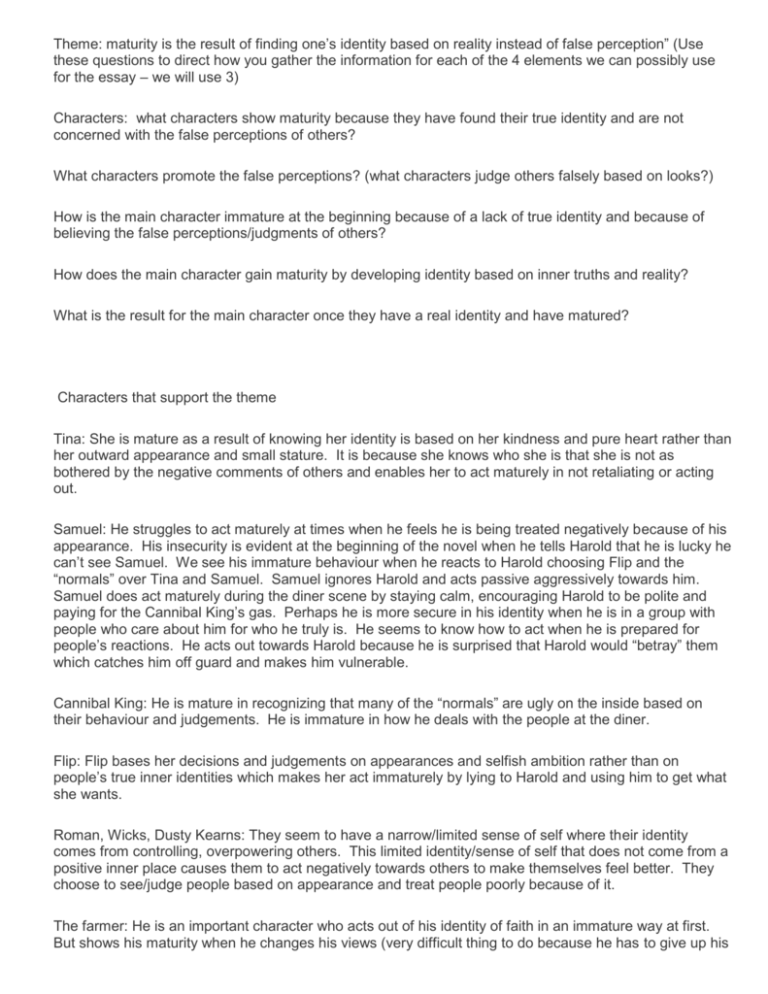
Theme: maturity is the result of finding one’s identity based on reality instead of false perception” (Use these questions to direct how you gather the information for each of the 4 elements we can possibly use for the essay – we will use 3) Characters: what characters show maturity because they have found their true identity and are not concerned with the false perceptions of others? What characters promote the false perceptions? (what characters judge others falsely based on looks?) How is the main character immature at the beginning because of a lack of true identity and because of believing the false perceptions/judgments of others? How does the main character gain maturity by developing identity based on inner truths and reality? What is the result for the main character once they have a real identity and have matured? Characters that support the theme Tina: She is mature as a result of knowing her identity is based on her kindness and pure heart rather than her outward appearance and small stature. It is because she knows who she is that she is not as bothered by the negative comments of others and enables her to act maturely in not retaliating or acting out. Samuel: He struggles to act maturely at times when he feels he is being treated negatively because of his appearance. His insecurity is evident at the beginning of the novel when he tells Harold that he is lucky he can’t see Samuel. We see his immature behaviour when he reacts to Harold choosing Flip and the “normals” over Tina and Samuel. Samuel ignores Harold and acts passive aggressively towards him. Samuel does act maturely during the diner scene by staying calm, encouraging Harold to be polite and paying for the Cannibal King’s gas. Perhaps he is more secure in his identity when he is in a group with people who care about him for who he truly is. He seems to know how to act when he is prepared for people’s reactions. He acts out towards Harold because he is surprised that Harold would “betray” them which catches him off guard and makes him vulnerable. Cannibal King: He is mature in recognizing that many of the “normals” are ugly on the inside based on their behaviour and judgements. He is immature in how he deals with the people at the diner. Flip: Flip bases her decisions and judgements on appearances and selfish ambition rather than on people’s true inner identities which makes her act immaturely by lying to Harold and using him to get what she wants. Roman, Wicks, Dusty Kearns: They seem to have a narrow/limited sense of self where their identity comes from controlling, overpowering others. This limited identity/sense of self that does not come from a positive inner place causes them to act negatively towards others to make themselves feel better. They choose to see/judge people based on appearance and treat people poorly because of it. The farmer: He is an important character who acts out of his identity of faith in an immature way at first. But shows his maturity when he changes his views (very difficult thing to do because he has to give up his pride and the idea that he knows it all in order to change his views). He acts very positively in the end encouraging Harold. A key part to having a strong and mature identity yourself is to then build up and encourage others in their true identity. (Tina does this as well when she’s always encouraging Harold). Looks like we could divide characters into those that build up and encourage maturity and true identity and those that don’t (tina and farmer and Samuel? Vs flip, roman and dusty) Harold: Harold is immature at the beginning of the novel. He receives his identity from others based on how they perceive him and his appearance. His parents tell him he can’t do normal things because of his albinism, he feels changed when his hair is dyed and throws his helmet away but hurt when he is called a Gobli. As he meets the other characters and learns from their identities and behaviours he begins to look inside himself. He finds his true identity through his strength of training the elephants and connecting with them on an emotional level and that who he is on the inside and how he values and treats others is more important than how he looks on the outside. This epiphany causes him to act maturely towards Roman and Flip when he includes them in the baseball game as well as in his decision to return home to take responsibility of his father’s business and stop his mother from worrying or grieving unneccessarily. (Could we have Harold as his own paragraph?) Setting: How does the town of Liberty support false perceptions and judgment based on false perceptions? How does the circus support false perceptions and judgement based on false perceptions? How does the Bible Belt and setting of the area where the farmer lives support false perceptions? How do the settings change (or the people within the settings) when they mature and let go of false perceptions? Should we separate it by venue or by time/place/social conditions – education, beliefs, politics etc? The setting of Liberty supports the theme -uneducated and ignorant because they are not exposed to different people (small town, everyone knows everyone, everyone looks the same) – however we may not be able to argue lack of education as a reason because Sam and Tina are uneducated and act more maturely and more respectfully towards all people. - depression – financial situation forces Tina and Sam and others to survive and make a living working for the circus? Fear of not enough to go around makes people more likely to judge others as part of the problem? - political situation – war, even though they were fighting against the discrimination and judgment of the nazis towards the jews, in the us they were still discriminating against african americans for looking different and against people with disabilities. - the circus – in the 1930s-40s the circus made its money by ostracizing and emphasizing the differences of their side show acts. People paid money to look at, make fun of and be entertained by people who felt they had no identity of their own. - beliefs – the religious beliefs of the people in Liberty and in the Bible Belt make judgements about people based on appearance rather than true identity. Harold’s step father says that he can’t go to the fair because they are “dens of evil” and the “haunts of gypsies”. Later the farmer doesn’t want help from the group of sideshow performers because he thinks they are devils or demons. It is their beliefs that make them narrowminded and cause them to act immaturely by judging people unfairly. Conflicts: What conflicts occur because of false perceptions/judgement? How does the main character gain maturity and a true identity from going through these conflicts? How do the resolutions of these conflicts show that letting go of false perceptions and judgment is the mature way to behave and live? The novel begins with Harold’s inner conflict related to his insecurity about his looks and how other people perceive him. He is at the Rattlesnake wishing his skin looked tanned the way it did under the water. Harold’s conflict with his parents is related to them judging him unfairly based on his looks which causes him to act immaturely and run away from his problems rather than communicate them. Harold’s fear of Samuel at first is because he judges him to be angry and scary based on the way he looks. The people in the diner cause uneccessary conflict when Samuel and the group are trying to have a quiet lunch. The diner owners judge them on their looks and kick them out. The farmer has an inner conflict when he is deciding whether or not to help the group and whether or not to let them help his daughter. He almost runs Harold over because he judges them based on their appearance rather than their identity as helpful, loving and wise people. Roman is in conflict with Harold because he judges Harold based on looks and also because they are both vying for Flip’s affection. Wicks Tina and the elephants The nazis vs magda The soldiers vs bob and the aboriginals/native americans Harold’s inner conflict about who to spend time with Tina and Conrad Roman and Conrad Harold vs kids in Liberty Group these into pvs p, vs self, vs society? Plot: How are we introduced to false perceptions and judgement at the beginning of the novel? How is the inciting incident related to lack of maturity because of these false perceptions and the absence of true identity? How do all the events of the rising action add suspense about the identity of the main character and the false perceptions others have? How does the climax demonstrate the turning point for the main character from immaturity and identity based on false perception to maturity and a true identity? How does the climax demonstrate the height of emotion and conflict because of a false perception? How does the falling action show that the main character has been affected by the climax and is making choices or living according to a new, true identity rather than judgement or false perception? How does the resolution resolve the conflict of false perception and demonstrate that the main character’s identity is truly changed and resolves the way others react or perceive them? We are introduced to Harold’s immaturity and lack of confidence when the novel begins as he identifies himself only based on his looks and how others perceive him (he is desperate for David to come back because David saw Harold positively). The inciting incident is also based on this as Harold decides immaturely to run away rather than deal with the conflict with his parents because they too identify him solely based on his appearance and condition, limiting what he can and can’t do or be. The rising action builds on this idea of judging others and acting innappropriately through the diner scene, farmer scene, and scenes with Roman, Flip and Harold’s struggle to choose between the two groups of people. All of this leads to the climax where the differences are forgotten and Harold recognizes his maturity and identity comes from his inner self and his accomplishment of training the elephants. The tragedy of acting on perception is solidified and at the highest point of emotional intensity when the elephant Conrad thinks he sees Tina hurting Harold and kills her for it. The falling action shows how these changes affect the characters. Harold decides to be responsible and go home secure in his new identity. He is mature now which shows in the way he walks and holds his head. The resolution finishes the story showing that when Harold is sure of himself, others can’t help but change the way they treat him. The kids treat him like a hero home from an adventure, full of questions and curiosity and his antagonist Dusty lets him walk by because he too sees that although Harold’s outer appearance has not changed his identity and true self has. He is also able to have the confidence to communicate with his mother and improve their relationship to show that AFTER writing your notes and organizing your information choose the 3 elements that make the strongest support for our theme statement. Those 3 elements will be your 3 body paragraphs for your essay.
